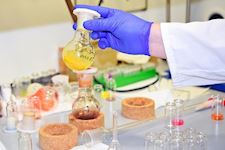Inorganic Chemistry
FREE PDF Certificate | Audio Visual Training | Tutor Support | 1 Year Access
The Teachers Training
Summary
- Tutor is available to students
Overview
Inorganic Chemistry is just one of the amazing courses on offer from Teachers Training to set you on the right path to enhancing your teaching career. Learn the core skills and fundamental knowledge you need to be the best teacher possible, and enhance your career potential!
The Inorganic Chemistry online training course provides all students with exclusive tutor support throughout their learning journey, so you can ask questions and get help when you need it. All students who complete the Inorganic Chemistry course will get instant access to a free PDF certificate as proof of their new skills.
Just like the rest of our amazing teacher training courses, the Inorganic Chemistry course and its curriculum have been expertly-designed by teaching professionals. Enrol on the Inorganic Chemistry course today and equip yourself with the skills and knowledge you need to succeed.
The Inorganic Chemistry course is made up of a number of comprehensive modules, each of which discusses an essential aspect of teaching and learning, which you can then apply in the workplace.
The Inorganic Chemistry training course is self-paced, meaning you can study at a pace that suits you. This Inorganic Chemistry course is ideal for part-time students or full-time students.
Course media
Description
Why Study Inorganic Chemistry with Teachers Training:
Here are just some of the reasons why our students enrol on the Inorganic Chemistry course:
- Access the Inorganic Chemistry through our dedicated online learning platform
- 24/7 access to tutor support
- The Inorganic Chemistry course is packed with interactive course content
- Affordable prices and high-quality training
- Complete the Inorganic Chemistry course 100% online, from any internet-enabled device
- Flexible course deadlines with full access to the Inorganic Chemistry course for one year
Course Curriculum
*** Inorganic Chemistry***
Unit 01: About the Course
- Learning objectives
- Example of a solved problem
Unit 02: Quantities and Units
- System of measurement
- International system of units
- Temperature units and scales
- Use and misuse of units
- Dimensional analysis
- Quantities and units: Solved problems
Unit 03: Atomic, Molecular and Molar Masses
- Atoms
- Nuclei
- Periodic table
- Relative atomic masses
- Moles
- Symbols, formulas and molar masses
- Atomic, molecular and molar masses: Solved problems
Unit 04: Formulas and Compositions
- Empirical formula from composition
- Composition from formula
- Nuclidic molecular masses and chemical formulas
- Formulas and compositions: Solved problems
Unit 05: Inorganic Nomenclature
- Introduction to nomenclature
- Naming binary compounds of nonmetals
- Naming ionic compounds
- Naming monoatomic cations
- Naming polyatomic cations
- Naming monoatomic anions
- Naming oxyanions
- Naming special anions
- Putting the names of the ions together
- Writing formulas for ionic compounds
- Naming inorganic acids
- Naming acid salts
- Naming hydrates
Unit 06: Chemical Equations
- Introduction to chemical equations
- Molecular relations from equations
- Mass relations from equations
- Limiting reactant
- Calculations from chemical equations: Solved problems
- Types of chemical reactions
Unit 07: Measurement of Gases
- Pressure
- Gas laws
- Boyle's law: Constant temperature
- Charles' law: Constant pressure
- Gay-Lussac's law: Constant volume
- Combined gas law
- Density of an ideal gas
- Dalton's law for partial pressures
- Collecting a gas over a liquid
- Deviation from ideal behavior
- Measurement of gases: Solved problems
Unit 08: The Ideal Gas Law
- Avogadro's hypothesis
- Molar volume
- Ideal gas law
- Gas volume relations from equations
- Gas stoichiometry involving mass
- The ideal gas law: Solved problems
Unit 09: Thermochemistry
- Heat
- Energy and enthalpy
- Enthalpy changes for various processes
- Rules of thermochemistry
- Thermochemistry: Solved problems
Unit 10: Atomic Structure
- Characters of light
- Interaction of light with matter
- Particles and waves
- Orbitals
- The Pauli Exclusion Principle
- Aufbau principle
- Electron configuration
- Atomic radii
- Ionization energies
- Electron affinity and magnetic properties
- Atomic structure: Solved problems
Unit 11: Chemical Bonding and Molecular Structure
- Introduction to chemical bonding
- Octet rule
- Ionic bonding
- Electron dot notation
- Covalent bonding
- Distinction between ionic and covalent bonding
- Predicting the nature of bonding in compounds
- Formal charges
- Dipole moment and electronegativity
- Hybrid orbitals
Unit 12: Solids and Liquids
- Crystals
- Close packing
- Crystal forces
- Liquid forces
- Solids and liquids: Solved problems
Unit 13: Oxidation - Reduction
- Introduction to redox reactions
- Oxidation number
- Oxidizing and reducing agents
- Ionic notation for equations
- Balancing oxidation-reduction equations
- Oxidation-reduction: Solved problems
Unit 14: Concentration of Solutions
- Composition of solutions
- Concentrations
- Molarity
- Normality
- Molality
- Mole fraction
- Comparison and summary of concentration units
- Dilution problems
- Concentration of solutions: Solved problems
Unit 15: Reaction Involving Standard Solutions
- Reaction involving standard solutions
- Reaction involving standard solutions: Solved problems
Unit 16: Properties of Solutions
- Introduction to chemical solutions
- Vapor pressure lowering
- Freezing point lowering
- Boiling point lowering
- Osmotic pressure
- Solution of gases in liquids
- Law of distribution
- Properties of solutions: Solved problems
Unit 17: Thermodynamics
- The first law
- The second law
- Entropy
- The third law
- Standard states
- Chemical equilibrium
- The equilibrium constant
- Le Chatelier's principle
- Thermodynamics: Solved problems
Unit 18: Acids and Bases
- Arrhenius concept
- Brönsted-Lowry concept
- Lewis concept
- Ionization of water
- Hydrolysis
- Buffer solutions
- Indicators
- Polytropic acids
- Titration
- Acids and bases: Solved problems
Unit 19: Complex Ions and Precipitates
- Coordination complexes
- Solubility product
- Precipitation
- Complex ions and precipitates: Solved problems
Unit 20: Electrochemistry
- Electrical units
- Faraday's laws
- Voltaic cells
- Standard half-cell potential
- Combining couples
- Free energy and Nernst equation
- Electrolysis
- Electrochemistry: Solved problems
Unit 21: Rates of Reactions
- Introduction to rates of reactions
- Rate constants and order of reactions
- First order reactions
- Other rate laws
- Energy of activation
- Mechanism of reaction: Molecularity
- Mechanism of reaction: Energetics
- Rates of reactions: Solved problems
Course Assessment
To successfully complete the Inorganic Chemistry course, students will need to complete a multiple-choice question assessment. All our assessments are online, and you will receive instant results through our online platform.
Certification
Certification from Teachers Training
After successfully passing the multiple-choice assessment, you will qualify for a Certification from Teachers Training.
- Get instant access to your free PDF certificate after successfully completing the assessment
- Order a hard copy certificate to be posted to you for only £8.99!
Your Inorganic Chemistry course certificate will add new, exciting skills to your CV and allow you to stand out from the crowd when applying for teaching jobs.
Who is this course for?
This Inorganic Chemistry course is ideal for those already in the teaching profession who want to add new skills to their CV, or prospective students who want to build their skill set and kickstart their teaching career.
This Inorganic Chemistry provides you with the necessary skills, knowledge and experience you need to progress your career and enhance your professional development.
Requirements
The Inorganic Chemistry course from Teachers Training has no formal entry requirements. However, to study the Inorganic Chemistry students must:
- Have a strong passion for learning
- Display a good understanding of the English language, as well as numeracy and IT skills
- Have a desire for entrepreneurship
- Be over the age of 16
If you meet these criteria, you can start studying the Inorganic Chemistry course straight away!
Questions and answers
Hello there Is this course provided in written format please?Thanks. Kind regards
Answer:Good Afternoon. The course is a video-based course. Thanks.
This was helpful.
Reviews
Currently there are no reviews for this course. Be the first to leave a review.
Legal information
This course is advertised on reed.co.uk by the Course Provider, whose terms and conditions apply. Purchases are made directly from the Course Provider, and as such, content and materials are supplied by the Course Provider directly. Reed is acting as agent and not reseller in relation to this course. Reed's only responsibility is to facilitate your payment for the course. It is your responsibility to review and agree to the Course Provider's terms and conditions and satisfy yourself as to the suitability of the course you intend to purchase. Reed will not have any responsibility for the content of the course and/or associated materials.




